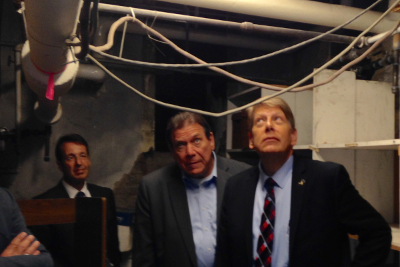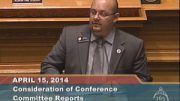By Jeffrey A. Roberts
CFOIC Executive Director
The Colorado legislature’s legal staff will shred old files on each bill and amendment prepared for members of the General Assembly – some going back to the 1930s – if lawmakers approve a proposed new records retention policy.
Last Thursday, the Committee on Legal Services toured the cramped, musty rooms of the state Capitol sub-basement where many of the paper files are stored in boxes.

Lawmakers inspect a state Capitol sub-basement room where member files are kept. Left to right: Rep. Daniel Kagan, D-Cherry Hills Village; Sen. Ray Scott, R-Grand Junction; Sen. Mark Scheffel, R-Parker.
“We wanted to take you down there so you could see the conditions … that it’s less than ideal and the files are susceptible on occasion to water damage, mud, bugs, dust,” Debbie Haskins, assistant director of the Office of Legislative Legal Services (OLLS), told the legislators. “And we’re running out of space. We only have room for about eight years of session files.”
Because of the space limitations, OLLS has been moving member files, as they’re called, to the Colorado State Archives. A policy adopted in 1993 requires that the records be kept indefinitely, but now the office wants permission to destroy all but the most recent eight years of them. Starting in 2017, the oldest files would be shredded after each legislative session.
The records include research materials, hand-written notes and drafts of bills, resolutions and amendments, some of which never were introduced or offered for consideration on the House or Senate floor.
All of it is considered to be confidential “work product” under the Colorado Open Records Act (CORA), and cannot be released to the public without permission from the current or former legislator who requested the bill drafts. But obtaining that permission can be “difficult,” Haskins said.
For the past 18 years, OLLS has asked lawmakers to sign a work-product waiver form when they leave office. But only 127 of as many as 225 legislators who left during that period have filled out the form. Forty percent waived their confidentiality privileges and 60 percent did not.
Of 76 former lawmakers who did not waive confidentiality, 56 asked that they be contacted each time someone requests their files. Twenty indicated that none of their files should be released and they do not want to be contacted for permission.
If a legislator has died, OLLS currently redacts any personal notes or private communications from the files before releasing them. However, Haskins, said, it is arguable that the work-product privilege survives a member’s death. In any case, she added, OLLS staffers don’t have a reliable way of knowing if a former lawmaker has died and they don’t know the whereabouts of some former legislators.
Under the proposed new policy, the files of deceased former lawmakers would not be released because OLLS has determined that “no other person can waive that privilege.”
OLLS gets about five informal requests for member files each year. Haskins said the office doesn’t consider the documents to have much historical value.
“We think a lot of this is just pages and pages and pages of edited notes,” she told Senate Majority Leader Mark Scheffel, R-Parker, and other committee members. “Should it be this word or that word? It’s changes to the drafts, but wouldn’t be something you would want to use to ascertain legislative intent.”
The proposed policy doesn’t recommend digitizing the old member files but it would require OLLS to keep electronic copies of any legal opinions or legal memos prepared for legislators.
The Committee on Legal Services tabled a discussion of the proposal until its next meeting on Nov. 17.
Follow the Colorado Freedom of Information Coalition on Twitter @CoFOIC. Like CFOIC’s Facebook page. Do you appreciate the information and resources provided by CFOIC? Please consider making a tax-deductible donation.




